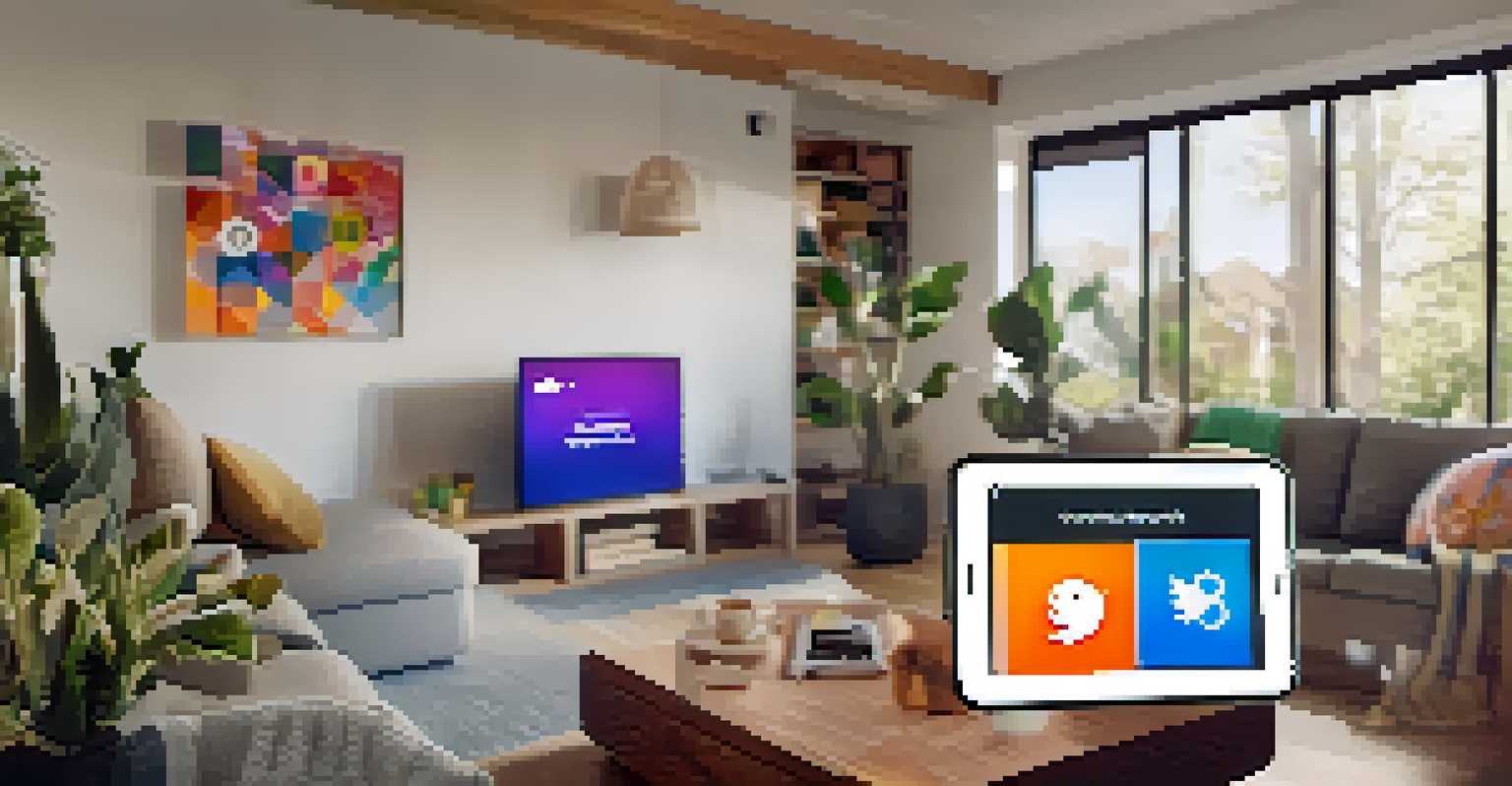How Social Media Shapes Our Understanding of Mental Health

The Rise of Mental Health Conversations on Social Media
In recent years, social media has become a powerful platform for discussing mental health. Previously taboo topics are now being openly shared, creating a sense of community among those who struggle. This shift allows people to realize they’re not alone in their experiences, which can be incredibly validating.
The greatest weapon against stress is our ability to choose one thought over another.
Platforms like Instagram and Twitter are filled with personal stories and mental health tips that encourage open dialogue. Users often share their journeys through anxiety, depression, and other mental health issues, fostering connection and understanding. This visibility can help reduce stigma, making it easier for individuals to seek help.
However, while these conversations are beneficial, they can also lead to oversimplification of complex issues. It's crucial for users to approach social media content with a critical eye, recognizing that personal experiences, while valuable, don't encompass the full spectrum of mental health challenges.
The Role of Influencers in Mental Health Advocacy
Influencers play a significant role in shaping conversations around mental health online. Many use their platforms to share their own struggles, offering followers a relatable perspective. This can inspire others to open up about their own experiences and seek help.

However, the impact of influencers can be a double-edged sword. While many provide genuine support and resources, others may promote misleading information or trivialize serious conditions. It's essential for followers to discern who to trust and to seek information from qualified sources.
Social Media Fosters Mental Health Talk
Social media platforms have opened up discussions about mental health, creating communities that help individuals feel less isolated in their struggles.
Ultimately, influencers can bridge the gap between awareness and action, but their messages should be approached with caution. The responsibility lies with both influencers and their followers to foster a safe and informed mental health community.
Social Media’s Impact on Mental Health Awareness
Social media has significantly increased awareness of mental health issues across various demographics. Campaigns like #MentalHealthAwarenessMonth have brought attention to important topics, encouraging people to prioritize their well-being. This heightened awareness can lead to more individuals seeking help, which is a positive outcome.
The more we share our story, the more we realize we are not alone.
Moreover, social media serves as a platform where organizations can share resources and information quickly. Users can access hotlines, support groups, and coping strategies at their fingertips, making help more accessible than ever. This democratization of information is a crucial step toward reducing barriers to mental health care.
However, with increased awareness comes the risk of misinformation. Users may encounter unverified content that can perpetuate myths about mental health. It’s vital for individuals to rely on credible sources when seeking information to ensure they’re getting accurate guidance.
The Dangers of Comparison Culture on Social Media
While social media can promote positive mental health discussions, it can also foster a culture of comparison. Users often showcase curated versions of their lives, leading others to feel inadequate or isolated. This can exacerbate feelings of anxiety and depression, particularly among younger audiences.
It's easy to forget that what we see online is often a highlight reel, not the full picture. The pressure to maintain an idealized image can lead to unhealthy behaviors, such as perfectionism or avoidance of genuine connections. Recognizing this can help users navigate social media more mindfully.
Influencers Shape Mental Health Views
While influencers can provide relatable perspectives on mental health, it's essential for followers to critically evaluate the information shared.
Encouraging authenticity and vulnerability in online spaces can counteract the negative effects of comparison culture. By sharing the ups and downs of life, users can create a more supportive environment that celebrates real experiences over unrealistic standards.
Navigating Misinformation in Mental Health Discussions
Misinformation about mental health can spread rapidly on social media, making it essential for users to be discerning. Posts that promote harmful stereotypes or offer dubious advice can do more harm than good. It's crucial for individuals to understand the difference between anecdotal experiences and evidence-based information.
Fact-checking and seeking information from reputable sources are key strategies to combat misinformation. Organizations like the National Alliance on Mental Illness (NAMI) provide accurate resources that can help users navigate their mental health journeys effectively. Encouraging critical thinking can empower individuals to seek out valid information.
In an era where misinformation can spread quickly, fostering a culture of informed discussion is vital. Users can support one another by sharing credible resources and challenging harmful narratives, creating a safer space for mental health conversations.
The Positive Effects of Online Support Communities
Online support communities have emerged as a lifeline for many individuals struggling with mental health issues. These spaces allow users to share their experiences, seek advice, and connect with others who understand their challenges. The anonymity of the internet can make it easier for some to open up about their struggles.
Members of these communities often provide encouragement and resources, making them invaluable for those feeling isolated. The sense of belonging that comes from sharing experiences can significantly improve one's mental health. It’s a powerful reminder that support can come from the most unexpected places.
Comparison Culture Can Harm Well-Being
The pressure to present idealized lives on social media can lead to feelings of inadequacy and anxiety, highlighting the need for authenticity.
However, while these communities can be beneficial, moderation is essential. Ensuring that discussions remain respectful and constructive helps maintain a positive environment. Encouraging users to also seek professional help when needed can create a balanced approach to mental health support.
Balancing Social Media Use with Mental Health Needs
Finding the right balance between social media use and mental health is crucial in today’s digital age. Setting boundaries around screen time can help prevent feelings of overwhelm or anxiety. It’s important for users to tune into their emotions and recognize when social media is negatively impacting their well-being.
Engaging in digital detoxes or curating feeds to include only positive and supportive content can make a significant difference. Following accounts that promote mental health awareness and self-care can create a more uplifting online environment. This intentional approach can transform social media from a source of stress to a tool for growth.

Ultimately, it’s about creating a personalized experience that supports rather than hinders mental health. Encouraging users to reflect on their social media habits can empower them to make choices that align with their emotional needs.